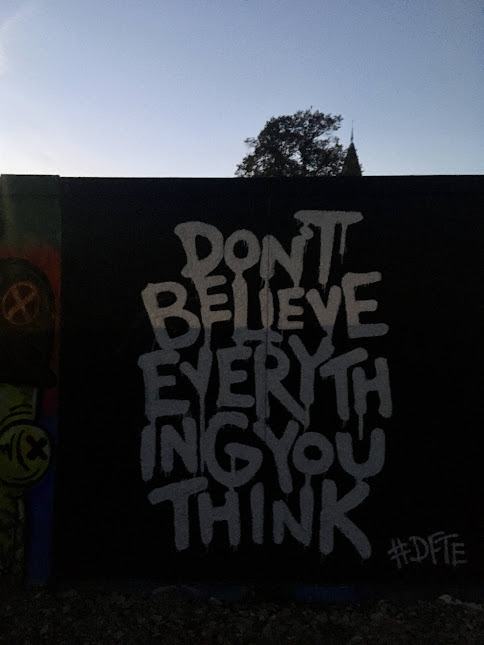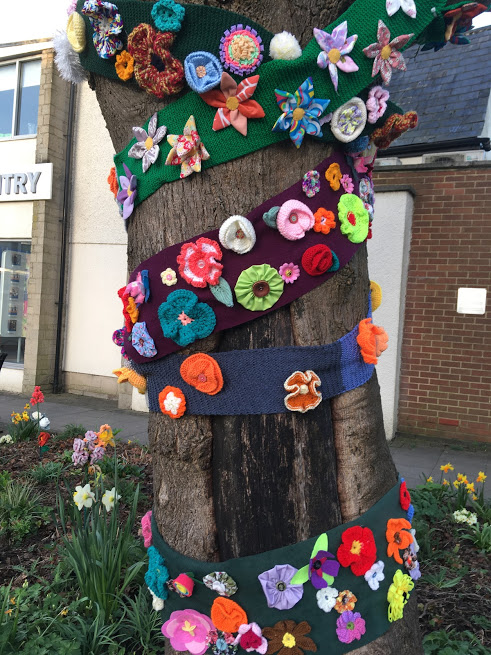This Week’s Bit of String: A childhood phantom
When I was little, I worried about the devil. Not in the way you might expect, though. My family was religious, I had a very strong impression of good and bad, and I was convinced Satan would jump out and drag me to hell if I so much as left a toy out of place.
I remember walking past our toy shelves once, and a stuffed animal fell off behind me. I stood there, thinking, Should I pick it up? I didn’t actually knock it down. Probably the good thing would be to pick it up anyway. Is Satan watching me, giggling like a cartoon villain, hoping I don’t pick it up because then I’ll be his?
Although I was genuinely frightened of hellfire and other punishments, I also found it exciting to imagine this powerful baddie investing so much attention in me. Everyone likes inventing villains, it’s not just writers. Politicians require them, social media users relish them.
What perhaps sets apart my early exercise in this is that I never believed he could force me to do wrong. I was worried about myself making a bad choice.

I still worry about that last bit. I think that’s the root of the concerns many of us face. I’ve realised that a source of constant stress for me is actually suspense, and a lack of trust in myself.
Will I sleep too late? Will I say the wrong thing at work? Will I manage to meet my own high fitness and writing expectations?
We’ve just had World Mental Health Day, and it’s the spooky season coming up. So I’ve been contemplating this fear that underpins so much: fear of failure.
What Happens Next?
Fear of the future is one thing. I have a newly moved-up GCSE student who will halt in his tracks, and look at me with panicked eyes. “I can’t cope anymore,” he says, “I just want to know what will happen.”
He’s terrified about the exams he’ll ultimately take, and about his home situation, and he puts it so plainly and recognisably. The world is massive and we’ve seen how easily we can be separated from those we love, how thoroughly our routines can be disrupted. Sometimes we just really want to know what’s going to happen!
For me, I assume that spanners will get in the works. Something will break down, someone won’t turn up, prices will keep rising, plagues and insurrections and natural disasters will occur. Life will try to stop me doing what I want to do. The question is, will I let it? How easily will I allow myself to be derailed?
The nice thing about writing stories is getting to decide what happens. I can stop a short story if I don’t want to know the ultimate fate of the main character is. Leave it with a trace of hope, a flicker of possibility. Or I can go super-omniscient, and decide the entire life of someone. In my current novel, based on the creation myth, some events have been decided for me, but there’s a lot of wiggle room. Eve’s motives and responses weren’t included in the Biblical account for some reason.
As writers, though, we do get an extra heaping of suspense and anxiety. Will it be good enough? Will anyone care?
Self-Trust
It’s hard to escape the fears regarding our own capabilities, partly because there will be things we WON’T be good at, people we can’t please, days we don’t finish everything. But constant mistrusting ourselves, dwelling ever in suspense and suspicion, nervous we’ll let ourselves down, that is unsustainable.

Here’s what it looks like for me, in case it’s similar for you. I like to take an early 2.5-mile walk, in addition to walking to and from work, and running around while there at school. I love being out in the quiet, and I like to bank some good exercise before the day begins.
I have to wake up around 5:30 to do this, and I avoid the disturbance of an alarm. So from 4-ish onwards, my mind wakes me up every 10-20 minutes checking I haven’t missed my chance.
Once I’ve gotten up and done my walk, I almost immediately start wondering if I’ll manage it tomorrow. Sure, I succeed most days, and I did so today. But what if I don’t tomorrow?
Silly, isn’t it? I’ve never thought of myself as an anxious person in the sense that other people struggle with anxiety. This issue for me is by no means crippling. Remaining in suspense, though, means that my feet don’t often touch ground. That is exhausting.
It helps to name the issue and recognise patterns. I like the term suspense. An edge-of-my-seat, thrill-a-minute existence as I compete with myself. It’s less clinical than anxiety, sometimes downright exciting, and perhaps, like a page-turner of a book, I can learn to pause and put it down now and then.
The other day, I broke my routine to show it will be ok. Instead of a morning walk, I went on the treadmill after work. Lo and behold, there was still time (and energy) to make dinner, do all the washing up, make it to a writing workshop on Zoom, and critique someone’s novel chapter afterward.
Finally, if I ensure that I’m speaking kindly to myself in the midst of this, it’s less scary and stressful. I’m pretty good at telling myself what I’ve done well, and cheering myself on. I just need to put more belief behind the thoughts, and trust myself.
Do you find life gets a bit too suspenseful sometimes? How do you deal with it?


